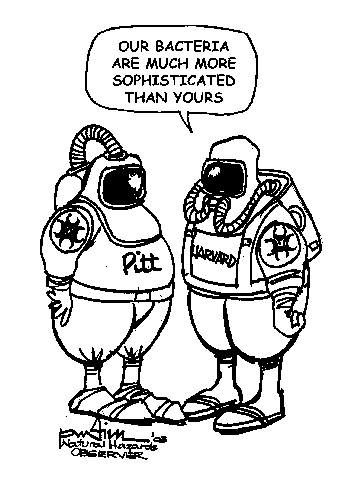Harvard Launches
Bioterrorism Preparedness AcademyLast fall, the Centers for Disease Control and Prevention (CDC) awarded $250,000 to Harvard University's School of Public Health and Kennedy School of Government to establish a National Preparedness Leadership Academy (NPLA). Reflecting national concern regarding bioterrorism and other terror threats, this university-wide training initiative will be geared toward senior government officials with responsibilities for preparedness and public health. The NPLA will develop a curriculum and training program to help officials at all levels of government better understand and meet the challenges of comprehensive national preparedness. The academy will strive to establish "connectivity" among this group in order to create a "seamless web of people, organizations, resources, and information that can best contend with a bioterrorist attack."
Once the framework of the NPLA is established, the CDC plans to provide additional funding. The developers of the academy hope that it will help prepare the U.S. not only for bioterrorism but also for emergent infectious diseases and natural disasters that might threaten public health. For further information, see http://www.hsph.harvard.edu/press/releases/press 10172003.html; or contact Kevin C. Myron, Office of Communications, Harvard School of Public Health; (617) 432-3952; e-mail: kmyron@hsph.harvard.edu; or Doug Gavel, Communications Officer, Kennedy School of Government, Harvard University; (617) 495-8290; e-mail: doug_gavel@harvard.edu.
Pitt and Hopkins Open New
Biodefense CenterThe University of Pittsburgh Medical Center has joined with the Johns Hopkins Center for Civilian Biodefense Strategies to open a new Center for Biosecurity at the University of Pittsburgh Medical Center. With the threat of bioterrorism gaining currency as a potential national hazard, the center will incorporate both biodefense policy studies and research. The center will work to prevent the development and use of biological weapons, to catalyze advances in science and governance that diminish the power of biological weapons as agents of mass lethality, and to lessen the human suffering that would result if prevention fails.
The center will be headquartered in Baltimore and have offices in Washington, D.C. and Pittsburgh. The center's various projects will seek to:
Provide independent, critical analysis for decision makers in government, national security, bioscience, medicine, and public health and promote the responsible use and governance of biotechnologies and bioscience;
Build international networks of scientists, scholars, medical and public health practitioners, and decision makers to improve communication, create links and facilitate development of new knowledge and ethical standards;
Create model medical and public health operational systems to manage epidemics and other high consequence events in times of peace and crisis; and
Develop scenarios for decision makers that illustrate the key challenges in bioterrorism preparedness and response and offer possible paths forwardFor more information, contact the center directly at The Johns Hopkins University, Center for Civilian Biodefense Strategies, 111 Market Place, Suite 830, Baltimore, MD 21202; (443) 573-3304; http://www.upmc-biosecurity.org.
Table of Contents for This Issue of the Natural Hazards Observer
Index of Past Issues of the Natural Hazards Observer
Natural Hazards Center's Main Page
